
iubenda | All-in-one Compliance for GDPR / CCPA Cookie Consent + more Plugin
The solution for GDPR compliance + more. Get your cookie banner, privacy policy, terms and conditions and handle cookie consent in just one plugin.
The iubenda plugin is an all-in-one, extremely easy to use 360° compliance solution, with text crafted by actual lawyers, that quickly scans your site and auto-configures to match your specific setup. It supports the GDPR (DSGVO, RGPD), UK-GDPR, ePrivacy, LGPD, CPRA / CCPA, CalOPPA, PECR and more, and seamlessly integrates with the latest versions of Google Consent Mode and IAB’s TCF.
It allows you to:
- ⚡️Scan your site and have solutions auto-configured to match your site’s specific needs.
- 🚀 Easily generate a fully customizable cookie banner,manage cookie consent and store legally required GDPR consent proofs for cookies.
- Generate a CCPA notice with working DNSMPI link as legally required.
- Activate IABs TCF to maximize ad earning.
- 🚀 Quickly generate a fully customizable privacy and cookie policy.
- Auto-detect user location and auto-applies the correct data privacy settings (needed if you have users from multiple regions like the US and the EU).
- 🚀 Capture, store and manage GDPR consent records for your webforms.
- 🚀 Effortlessly generate professional Terms and Conditions to protect you from liabilities and more.
- Translate all documents with a single click (supports 10 languages).
- Compatible with Google’s Accelerated Mobile Pages (AMP)
And of course, basic set-up is completely free.
Features
This all-in-one plugin lets you integrate all iubenda compliance solutions in a single install and basic set-up is completely free.
⚡️ The plugin scans your site and auto-configures everything based on your site’s specific needs.
⭐ All our solutions are fully responsive (perfect for all screen sizes) and WCAG Level AAA Compliant.
They’re auto-updated when the law changes so that they’re always up-to-date and our built-in site scanner runs periodic scans on your site and alerts you if it detects something that should be added to your compliance documents.
Our solutions support the GDPR (DSGVO, RGPD), UK-GDPR, ePrivacy, LGPD, CCPA / CPRA, VCDPA, CalOPPA, PECR and more.
Privacy Controls and Cookie Solution
Includes cookie banner/CCPA notice, and cookie consent management (blocking scripts until consent is collected as legally required). Free basic setup and full CCPA support.
- Easy and guided set-up: Analyzes your site and auto-configures everything to make set-up as easy as possible.
- Fully customizable cookie banner – change functionality, design, location, colors, add your logo and more.
- Asynchronously re-activates cookie scripts once consent is collected (no page reload needed).
- Lightning-fast: won’t affect page performance.
- Auto-detects and blocks a wide range of 3rd party scripts like Google Analytics, Google Maps, Facebook and Instagram widgets, Youtube, Twitter, PayPal, Disqus, Outbrain, AdRoll, Kissmetrics, Freshchat and more.
- Allows you to provide your users with granular, per-category preference control (e.g. basic functionalities, experience enhancement, targeting & advertising)
- Google Consent Mode (both Basic and Advanced implementations; no extra setup required): Enables efficient conversion tracking even without user consent for cookies and tracking technologies, enhancing Google Analytics and Ads performance.
- Integrates with IAB’s Transparency and Consent Framework (TCF) to maximize ad revenue (needed if your site uses ad networks like Google ads and more)
- Compatible with Google’s Accelerated Mobile Pages (AMP)
- Allows you to auto-detect and limit prior-blocking and cookie consent requests only to users from the EU – where this is a legal requirement for GDPR compliance – while running cookies scripts normally in regions where you are still legally allowed to do so.
- Features an easy-to-use interface for entering custom scripts and iframes
- Cookie database feature allows you to auto-set cookie lifetime information.
- Display CCPA / CPRA notice and opt-out link as required by theCalifornia Consumer Privacy Act
- Provides cookie consent analytics for high-traffic sites.
- Detects bots/spiders and serves them a clean page so that your SEO efforts are never compromised
Privacy and Cookie Policy Generator
This solution lets you generate professional privacy and cookie policies in minutes.
- Super easy interface, guided process, fully customizable
- All legal text written by actual legal professionals
- Quick select from over 1900 clauses or create custom clauses
- Activate cookie policy in a single click
- Site Scanner to quickly detect which services/ clauses you need to add to your policies.
- One-click translation. 10 languages supported: English-US, English-UK, Italian, French, Spanish, German, Portuguese, Brazilian Portuguese, Russian, Dutch.
- One-click activation for country/ region-specific text.
- Compatible with Google’s Accelerated Mobile Pages (AMP)
- Documents are remotely updated when legal requirements change
- Manage documents for multiple sites from a single dashboard
- White label option allows you to seamlessly integrate your privacy policy text into the body of your webpage
Consent Database
Collect consent, document opt-ins and opt-outs via your web forms. This solution smoothly integrates with your consent collection forms to auto-create legally required GDPR and LGPD consent records.
About Legal requirements and Consent Records
These records should include a userid, timestamp, consent proof, record of the consenting action, and the legal documents available to the user at the time of consent, among other things.
This plugin is THE most complete solution for recording, sorting and maintaining GDPR & LGPD records of consent for optimal privacy compliance.
The plugin also boasts built-in compatibility with WordPress comment form, Contact Form 7, Elementor forms and WP Forms plugins for your convenience, but can be manually integrated with any type of web-form and can even store consent proofs for consents collected offline (e.g in-store sign-ups) via WP media upload.
- It’s auto-compatible with and allows super easy mapping of Contact Form 7, WP Forms, WordPress comment, Mailchimp for WordPress, Germanized for WooCommerce, Elementor forms and WooCommerce checkout forms
- Also allows manual integration with any type of web-form
- For each consent, track the form/wording the user was prompted with at the time of the consent collection
- Accurate timestamping and recording of consenting action
- Flexibly upload any form of proof of consent or legal notice, including a PDF if consent was collected offline
- It provides a high granularity: map individual form fields, exclude fields (like password inputs), add legal notices available at the time of consent collection, indicate double opt-in, set preferences and more
- REST HTTP API and JS SDK, to give you total control and how and when consent is stored
- Store multiple preferences for each user (e.g. if you have multiple newsletters or opt-ins)
- Features an easy-to-use interface for entering custom scripts and iframes
- It provides API input field for quick and easy activation
Terms and Conditions
Create your terms and conditions in minutes.
Customizable from hundreds of combinations, available in 10 languages, powerful and precise — our solution is capable of handling even the most complex, individual scenarios. Optimized for e-commerce, marketplace, SaaS, apps and more.
- Easy, guided set-up
- Expertly crafted at the hands of our international legal team
- Pre-defined scenarios modules for everything from basic disclaimers to copyright licenses, account terminations rules, product-comparison, age-related disclaimers, virtual currency, and more.
- Plug-and-go integrations for popular eCommerce solutions like Shopify, Wix, Squarespace, Weebly, WooCommerce, PrestaShop and more
- One-click translation (10 languages supported EN-US, EN-UK, IT, FR, ES, DE, PT, PT-BR, RU, NL)
- Compatible with Google’s Accelerated Mobile Pages (AMP)
- Manage documents for multiple sites from a single dashboard
- White label option allows you to seamlessly integrate your privacy policy text into the body of your webpage
iubenda and Third-party services
The iubenda plugin makes use of two iubenda services:
- A service named Quick generator that allows you to login/signup on iubenda.com and creates privacy policies for your website right from the plugin. The service is publicly available and described in detail on the official documentation page on the iubenda website.
- An internal service to scan the user’s website and detect the correct data privacy settings to be applied, depending on the website location.
External CSS and JS assets used in the plugin or applied to the user’s website by iubenda are delivered either by cdn.iubenda.com or cdn.ampproject.org (only when the AMP settings are activated). Any services available at cdn.iubenda.com are provided by iubenda and the respective privacy policy applies. Any services available at cdn.ampproject.org are provided by Google and the respective privacy policy applies.
If you integrate the Privacy Controls and Cookie Solution to allow your website to request and manage consent for the use of cookies and similar technologies, when the final user navigates on your website/application, then the Privacy Policy of iubenda Privacy Controls and Cookie Solution applies.
Similarly, when you integrate the Consent Database tool to keep track of the user’s consent activities and store the information necessary to record evidence of that consent, then the Privacy Policy of iubenda Consent Database applies.
For further details on the iubenda tools and services privacy policies please refer to the privacy policy on the iubenda website.
About iubenda
We help companies all over the world to keep their websites and apps compliant with international privacy laws for optimal peace of mind. More here.
Languages
Our services are currently available in the following languages:
- English US and UK
- Italian
- French
- Spanish
- Portuguese
- Brazilian Portuguese
- German
- Dutch
- Russian
Support & Updates
All our solutions and plugins are regularly updated and well maintained to ensure that you’re always protected.
You can access our friendly support in multiple languages (currently EN, IT, DE, FR, PT, PT-BR) via info@iubenda.com, our onsite chat(just click the green Help button on the right side of the page).
Other links:
Screenshots
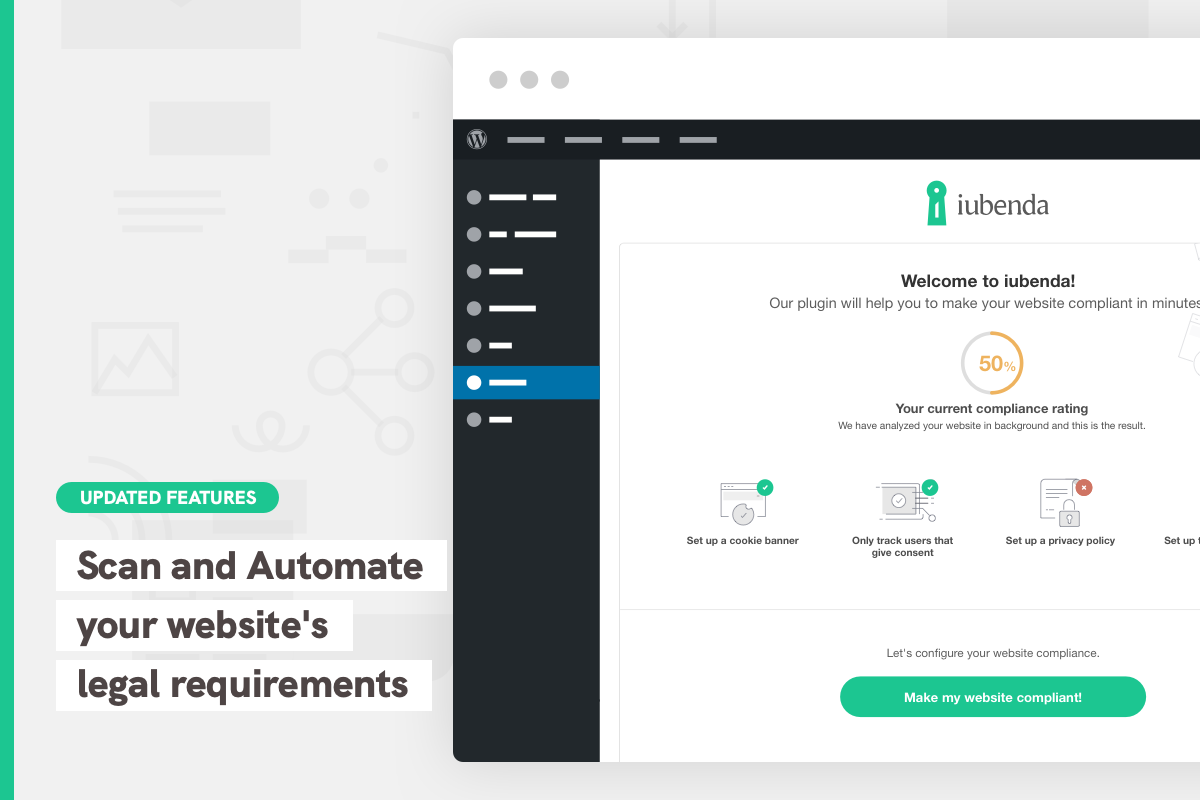
Scan and Automate your website's legal requirements
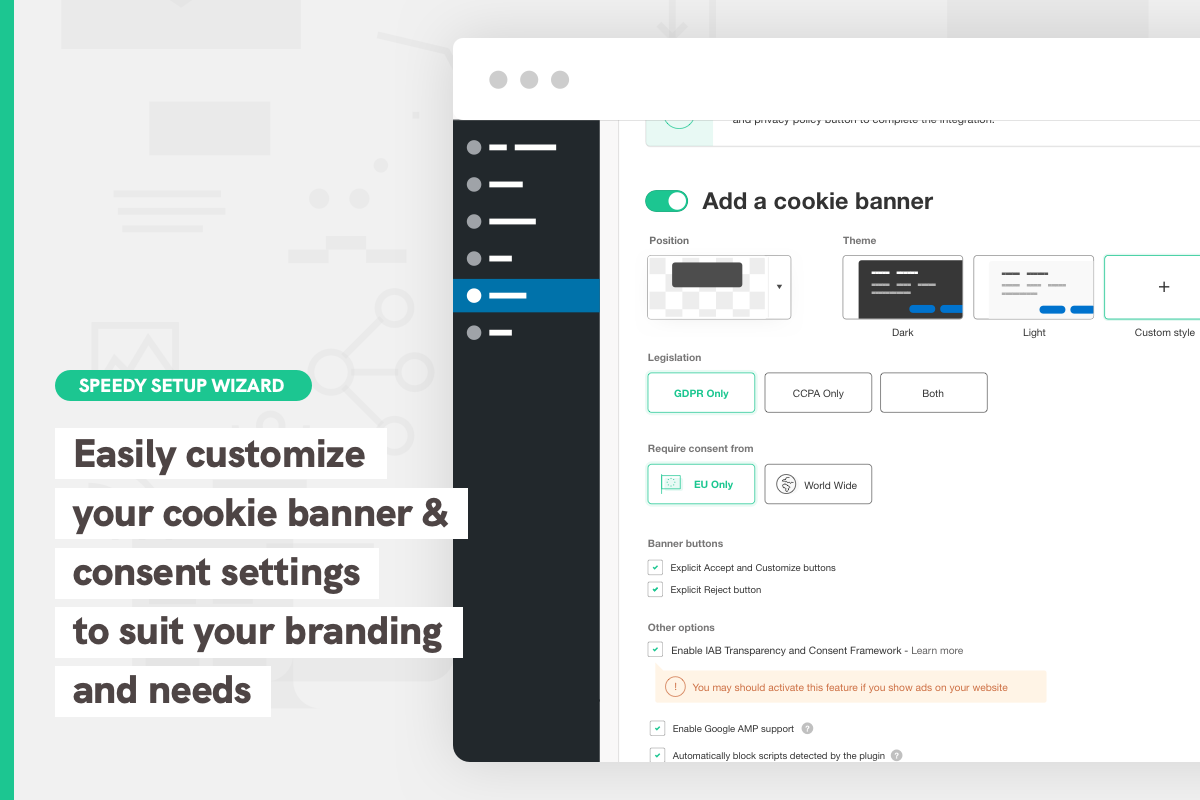
Easily customize your cookie banner & consent settings to suit your branding and needs
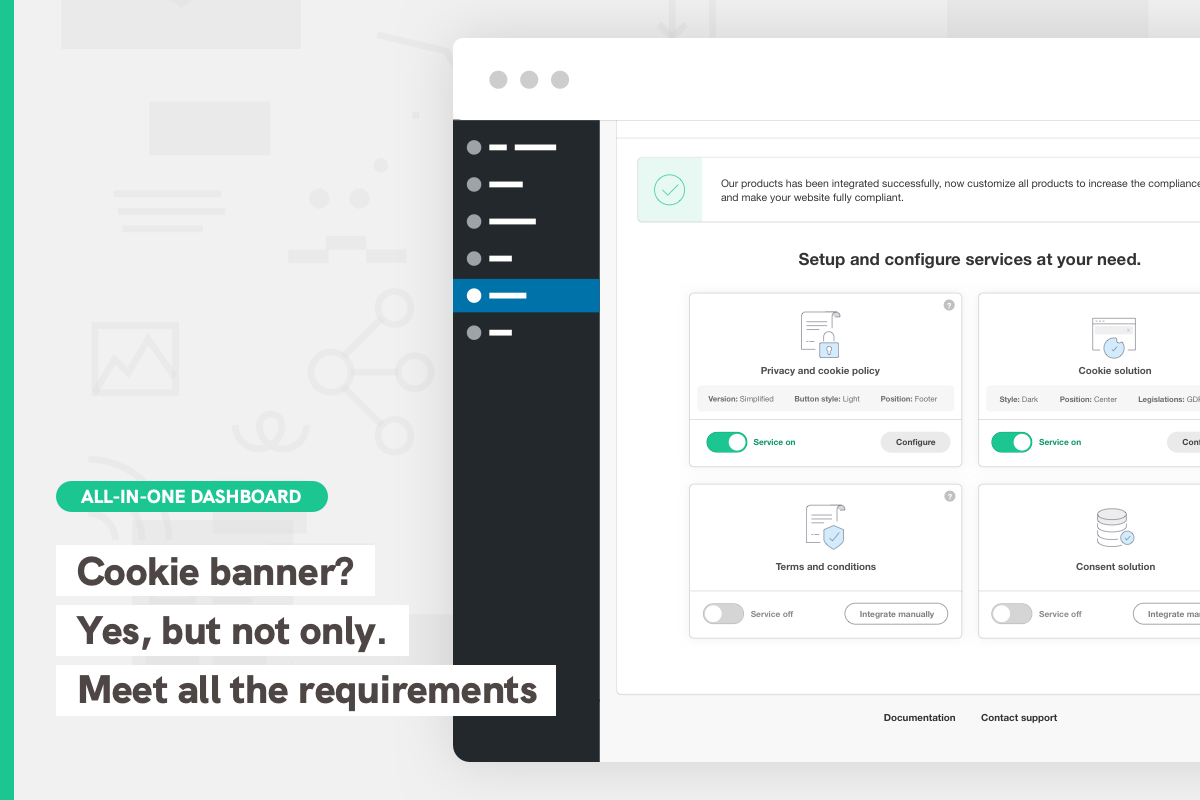
Cookie banner? Yes, but not only. Meet all the privacy compliance requirements
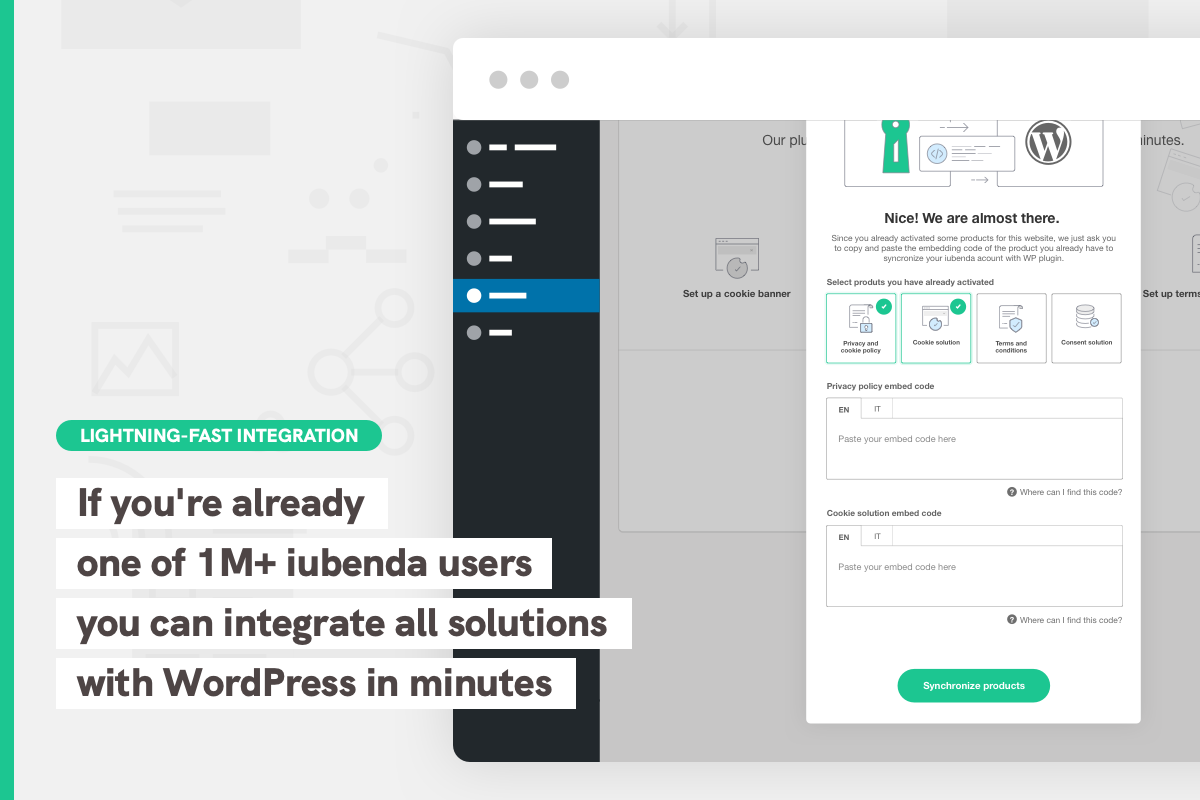
If you're already one of 1 M+ iubenda users you can integrate all solutions with WordPress in minutes
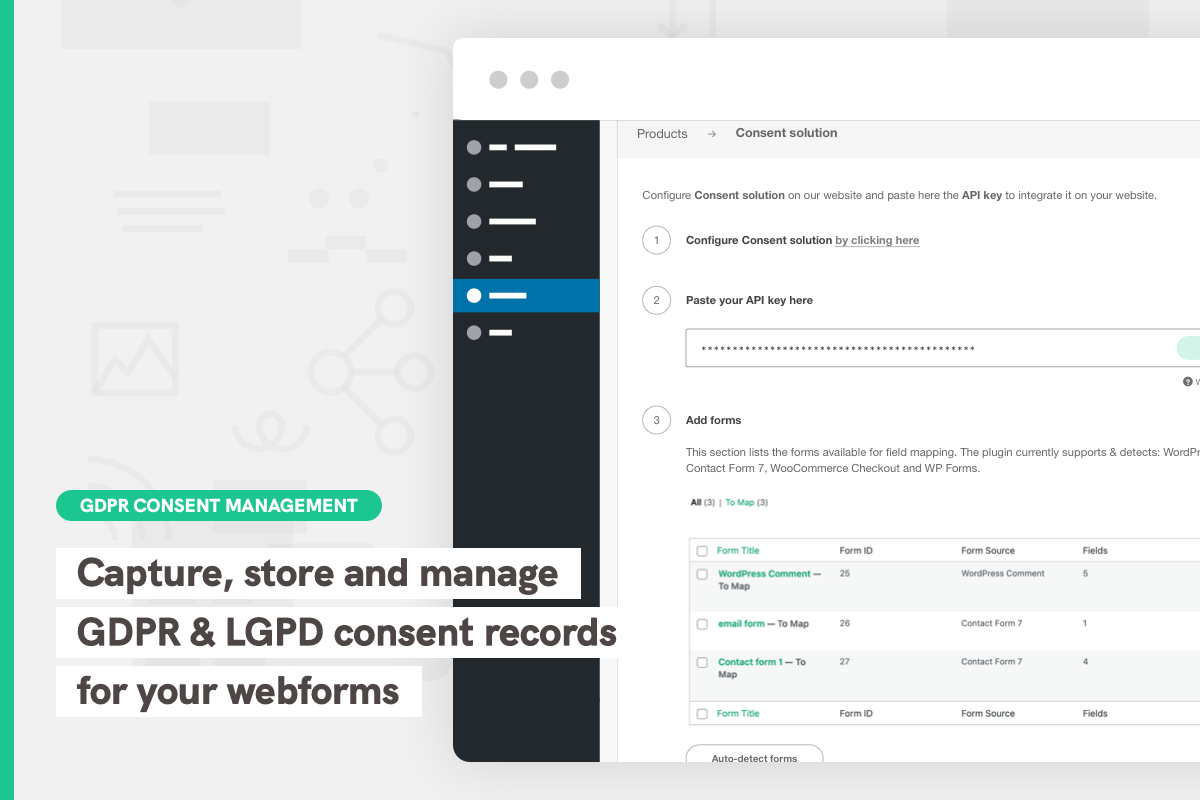
Capture, store and manage GDPR & LGPD consent records for your webforms
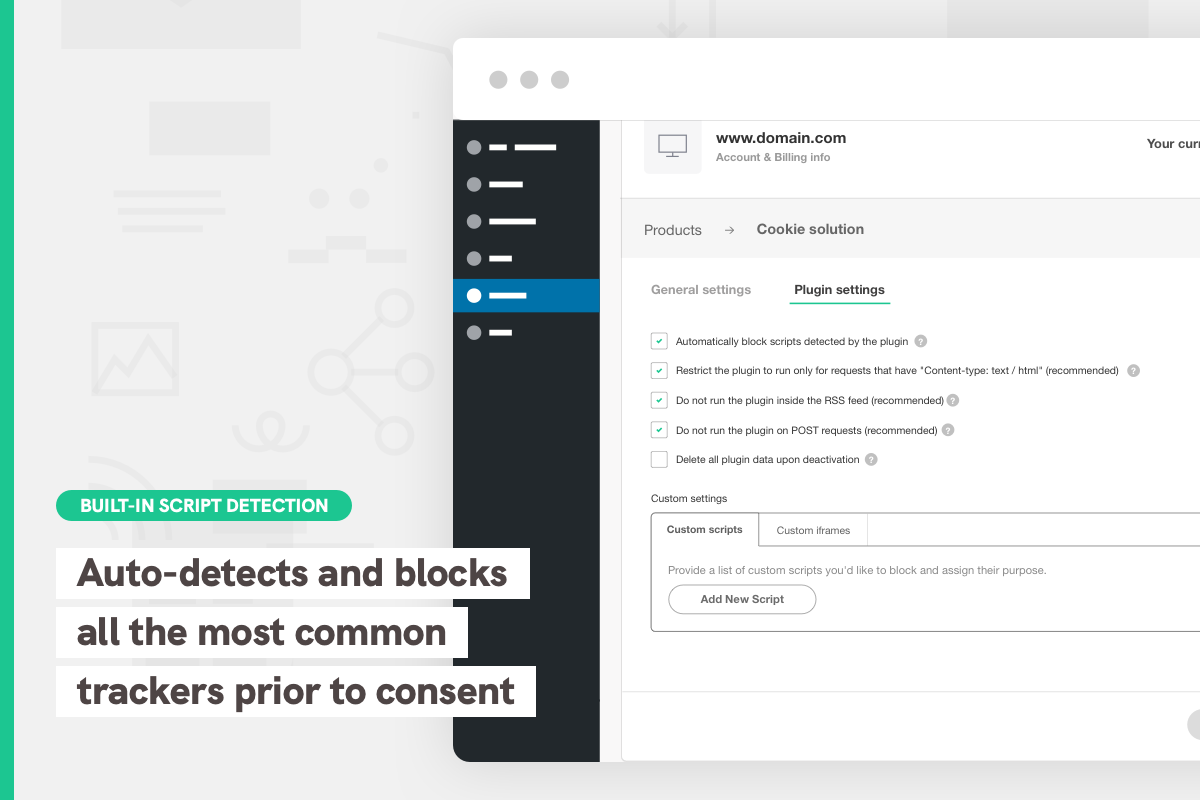
Auto-detects and blocks all the most common trackers prior to consent
FAQ
If you are experiencing troubles updating to the latest version, please ensure that your cookie banner is correctly activated and configured, and you’ve cleaned up you WordPress cache. In case of emergency, you can safely rollback to the previous version by using WP Rollback.
Our extensive documentation makes it easy for you to learn all you need to know about compliance and how to use iubenda’s products on your site or app. You can access it here. You can also visit our support forum here.
A good rule of thumb is to always comply with the laws of the region where you are based as well as the region or country in which the users you target are based.
📌 However, for an even easier, more specific way to tell which laws apply to you, you can simply take this 1-minute quiz.
If you’re based in the European Union – including the UK – or target EU users, and your website uses cookies or trackers (which it most likely does), then, yes, you do need a cookie notice.
A privacy policy is a legal requirement almost everywhere in the world. You need it because under most countries’ laws, you’re legally required to inform your users about the data you’re collecting and how you’re processing them.
Find out what should be in a privacy policy here.
While Terms and conditions aren’t always legally mandatory, they’re always recommended. They help you protect you and your business from legal liabilities.
However, please note that if you run an e-commerce, then you’ll most likely need terms and conditions, as they usually contain legally mandatory information related to commerce.
GDPR stands for General Data Protection Regulation (Regulation (EU) 2016/679). The GDPR specifies how personal data should be lawfully processed (including how it’s collected, used, protected or interacted with in general).
While it was still an EU member state, the UK was very instrumental in the creation of the GDPR and therefore, Post-Brexit, has adopted the UK-GDPR – which currently is essentially the same as the European GDPR.
DSGVO & RGPD are, respectively, the German and Spanish translations of the English acronym of the General Data Protection Regulation (GDPR).
Learn more about the GDPR here.
In effect since 2002, the ePrivacy Directive (Cookie Law) was created to put guidelines in place for electronic privacy, including email marketing and cookie usage.
Under the Cookie law, organizations that target users from the EU must inform users about data collection activities and give them the option to choose whether it’s allowed or not.
This means that if your site/app (or any third-party service used by your site/app) uses cookies or similar technologies, you must first obtain valid consent prior to the installation of those cookies, except where they fall into the exempt category.
In practice, you’ll need to:
- show a cookie banner at the user’s first visit;
- implement a cookie policy that contains all required information;
- allow the user to provide or refuse consent;
- block cookie/ tracker scripts from running until consent is provided.
You can learn more about how the ePrivacy and GDPR interact in regards to cookies and trackers here.
The Privacy and Electronic Communications Regulations 2003 (PECR) is the UK’s implementation of the EU’s ePrivacy directive and set’s out rules for electronic privacy
California’s most well known Privacy Laws are some of the most robust in the United States. They are both relevant to you if you likely have users that are based in the state of California.
California Online Privacy Protection Act (CalOPPA) – since 2002
Law requires commercial websites and services to have a privacy policy.
The document:
- Must clearly state what info is collected and who it’s shared with.
- Must disclose how a business’s website or online service responds to Do Not Track signals from Web browsers.
- Must include the effective date of the Privacy Policy and more.
California Consumer Protection Act (CCPA)
- Grants users additional rights such as the right to be informed and the right to access information you’ve collected about them – but perhaps, most relevant to marketing is the right to Opt-out.
- Under the CCPA, users have the right to opt-out of any processing that can be considered a sale of their data. Sale, in this context, is quite broad and simply means sharing for any profit- monetary or otherwise.
*Note that in the case of minors, they are granted the right to Opt-in. *More about the CCPA here.
The Brazilian General Data Protection Law, the Lei Geral de Proteção de Dados Pessoais, (LGPD) can be considered as Brazil’s answer to the GDPR – with the Brazilian law aligning with the EU Regulation in many ways, while differing in others. You can learn more about it here.
Changelog
3.10.6
- Fixed: Consents not sent with WooCommerce checkout blocks in version 8.3+.
- Fixed: Duplicate CS Configuration echo on multiple wp_enqueue_scripts calls
3.10.5
- Fixed: special character encoding in configuration script
- Update outdated product names.
3.10.4
- Fixed: Infinite loop on subdomains on AMP pages
3.10.3
- Fix: Resolve conflict by updating variable names to prevent interference with Consent Database functionality
3.10.2
- Support for WordPress 6.5
- Fix: DNS Lookup Optimization
3.10.2-beta
- Fix: DNS Lookup Optimization
3.10.1
- Prioritize the iubenda script over other scripts.
3.10.0
- Introduced iubenda automatic blocking feature.
3.9.0
- Introduced home page widget with compliance report summary.
3.8.0
- Add Google Consent Mode v2 support for seamless conversion tracking.
3.7.9
- Resolved issue preventing the saving of the consent database when using Elementor forms.
- Corrected the problem of adding multiple Elementor forms on a single page.
3.7.8
- Fix ConS saving preference issue
3.7.7
- Support WordPress 6.4
3.7.6
- Tweak: Fix compatibility issues with PHP 8.2
3.7.5
- Bugfix: Activating plugin using WP CLI
3.7.4
- Bugfix: Continuous Radar Request Sending on Timeout
3.7.3
- Fix compatibility issue with new Jetpack plugin
- Add no script tag link for CMP
3.7.2
- Extend support for forms inside elementor library post type
3.7.1
- Bugfix: compatibility issue with old Elementor version
3.7.0
- Add iubenda legal component to Elementor theme builder
- Recognize and map Elementor forms in Consent Solution
- Bugfix: mapping form fields in Consent Solution
3.6.2
- Bugfix: Remove orphan closing script tags
- Update: Update library to the latest version 4.1.14
3.6.1
- Fix: Add remove the added white space to empty CS config
- Update: Add missing translation
3.6.0
- New: Add GPP stub
- Update CS to match US requirements
3.5.10
- New: Add checkbox to stop showing the CS banner for admins
3.5.9
- New: Add a checkbox to block the GTM under purpose #2
- Bugfix: Allow adding custom attributes on inline scripts
3.5.3
- Bugfix: Remove empty config from CS config
- Bugfix: Avoid run plugin updates for anonymous users
3.5.2
- Fix errors when required php exts is not installed
- Addressed an issue with parsers related to the libxml library
3.5.1
- Bugfix: Accent letters in Privacy Controls and Cookie Solution
- Verify the installation of php-xml before using it
3.5.0
- Escape variables and options
- Use wp_enqueue commands
- Feature: Allow adding embed code in PP
- Sanitize all inputs before saving any options
- Clean up malicious code if exists
3.4.1
- Improve security by sanitizing data
- Update PHP Simple HTML DOM Parser library to version 1.9.1
- Remove deprecated (Faster/Page) classes
3.4.0
- New: Add support for US legislation
3.3.3
- Fix security issue
3.3.2
- Bugfix: Fix language tabs in multi-language
3.3.1
- New: Support WP 6.1
- Fix translation of CS “required” in the wizard
- Fix typo in ConS product page
3.3.0
- New: Support LGPD legislation.
- New: Support European Portuguese beside Brazilian Portuguese
- Tweak: Support Avada theme builder
- Bugfix: Check block/widget classes are supported
3.2.6
- Add missing translation
- Bugfix: remove display none to show the blocked scripts
- Bugfix: Show PP & TC widgets/block after changing theme
- Bugfix: Hide block/widget if the pp & tc not enabled
3.2.5
- Bugfix: Handle error on plugin activation
3.2.4
- Add PCP and T&C embedding section
3.2.3
- Support PHP 8
3.2.2
- Add analytics to the plugin
3.2.1
- Bugfix: Show Iubenda legal block in WP Block Editor
3.2.0
- Set EN as default language on QuickGenerator
- Bugfix: PCP detection not correctly rated
- Translate plugin into [IT, FR, PT-BR, ES, NL]
- Pre-select website language on the language setup dropdown
3.1.2
- Fix issue in radar score after resetting plugin data
3.1.1
- Revert: Add the ability to include PP and TC buttons for default WP
3.1.0
- Move plugin settings to a separate page
- Add the ability to include PP and TC buttons for default WP
3.0.10
- Add a link to show the rating calculation page
- Show Notification to encourage the user to verify his account
3.0.9
- Move www.googletagmanager.com/gtag/js to analytics #4
3.0.8
- Fix SSRF security vulnerability
- Remove googletagmanager.com/gtm.js from basic interaction
3.0.7
- Support WP 6.0
- Stop forcing purposes from Quick Generator widget
3.0.6
- Bugfix: Run upgrade process after using a new WP version
- Bugfix: Issue in integration with CF7
3.0.5
- Allow creating CS from QG widget
3.0.4
- Bugfix: Stop parsing code in Cookie banner
- Bugfix: Errors on plugin update
3.0.3
- Tweak: Prefix array_get with iub_ to avoid break comptability with other plugins
3.0.2
- Bugfix: remove data on plugin deactivation
3.0.1
- Bugfix: Fix issue after updating to new plugin
3.0.0
- New: Support Privacy Policy
- New: Support Terms and Conditions
- New: Generate your cookie solution with few clicks
- New: Use Radar to scan current website
2.5.91
- Bugfix: save CF7 Consent
2.5.9
- Support WP 5.9
- Set Skip parsing default to false
- Add filter after parsing forms to allow others to extend the Cons forms
2.5.8
- Bugfix: restrict recaptcha field in ConS
2.5.7
- Bugfix: Pagination into the consent solution tab
2.5.6
- Disable automatic block on page builder pages
2.5.5
- Disable CS on Divi builder page
2.5.4
- Cast preferences field into boolean in WPForms.
- Fix preference field not saved in CF7.
- Integrate with Germanized for WooCommerce in ConS.
- Allow only the mapped forms in ConS.
- Allow mapping the ConS forms without specifying the preferences field.
2.5.3
- Fix sub sub domain of generated AMP file.
- Add settings anchor in plugin page
2.5.2
- Tweak: Disallow using custom CSS in AMP
2.5.1
- Fix: Track the selected checkboxes into wpforms
2.5.0
- Integrate with Mailchimp to add it in woo-commerce checkout form.
- Stop parsing scripts in Divi page builder
2.4.3
- Fix field mapping in Cons forms
2.4.2
- Fix comptability with PHP 8.0.2
- Update WP support to 5.7
2.4.1
- Save Cons for non Ajax forms in WPForms
- Fix saving consent in CF7
2.4.0
- New: Use the new check consent endpoint
- Fix: Regenerate AMP files on plugin update
- New: Support WPRollback on plugin update
2.3.18
- Fix: Avoid overriding the purposes attr if it was set
2.3.17
- New: Use the new check consent end point
2.3.16
- Fix: purpose evaluation for iframes blocking
2.3.15
- Fix: ConS saves the wrong terms & conditions legal_notice
2.3.14
- Tweak: Support WP 5.6
2.3.13
- Fix: Check script type before getting content in GTM
2.3.12
- Fix: Allow banner customization in AMP
- Tweak: Add alert about lack of permissions on templates folder
- Tweak: Add GA to per-purpose blocking support
- Fix: Add per-purpose on inline script tags
2.3.11
- Fix: Move the FB connect to experience enhancement
- Tweak: Add Google GPT to per-purpose blocking support in engines
2.3.10
- Add action (Hook) before rendering the source form
- Change the AMP consent href
2.3.9
- Fix: Woocommerce custom theme support
- Fix: Detect changes on WPforms
2.3.8
- Tweak: Add Google GPT to per-purpose blocking support
- Fix: admin.js ready method deprecation
2.3.7
- Fix: admin.js ready method deprecation
2.3.6
- TCF v2 Support
2.3.6-beta
- TCF v2 Support
2.3.5
- Security Fix: limit url sanitize to http protocols
2.3.4
- Security Fix: limit url sanitize to http protocols
2.3.3
- Fix: AddThis purpose category
2.3.2
- Fix: Configuration regular expression issue in some edge cases
2.3.1
- Fix: Error on AMP configuration during install in some edge cases
- Fix: Invalid www detection during AMP configuration generation process
- Fix: Regex for iubenda script url in AMP configuration
- Tweak: Added noindex for generated AMP configuration file
2.3.0
- Fix: Multiple consent forms per page support
- Fix: WP Forms checkbox field compatibility
- Tweak: AMP consent geolocation support
2.2.0
- Fix: Undefined notice during plugin update
2.1.0
- New: Per-purpose script blocking support
- New: “Reject” button support
- New: Google AMP compatibility option
- Tweak: Improved regular expression on per-purpose feature detection
- Fix: Safari unrecognized expression on CSS wildcards
2.1.4-beta
- New: Multilingual support from AMP
2.1.3-beta
- Tweak: Block tracking code from WP AMP plugins
2.1.2-beta
- New: Google AMP compatibility option
2.1.1-beta
- Tweak: Improved regular expression on per-purpose feature detection
- Fix: Safari unrecognized expression on CSS wildcards
2.1.0-beta
- New: Per-purpose script blocking support
- New: “Reject” button support
2.0.2
- Fix: initialize iubenda CS on POST requests not working
- Tweak: iubenda generic menu icon switched to iubenda logo
2.0.1
- New: Jetpack tracking blocking support
- Fix: add_submenu_page and add_menu_page called incorrectly in WP 5.3
2.0.0
- New: Introducing iubenda Consent Solution integration
- Tweak: Simple HTML Dom update to 1.9
2.0.3-beta
- New: Introducing WooCommerce checkout form field mapping compatibility
2.0.2-beta
- New: Introducing wildcard support for scripts and iframes
2.0.1-beta
- New: Option to initialize iubenda CS on POST requests
- Tweak: Update Cookie Solution and Consent Solution copy
2.0-beta
- New: Introducing iubenda Consent Solution integration
- Tweak: Simple HTML Dom update to 1.9
1.15.8
- New: Introducing a way to skip specific script parsing
- Fix: Google ReCaptcha with Contact Form 7 initialization issue
- Fix: Improved handling of iubenda script HTML
- Tweak: Support links update
1.15.7
- Fix: Google ReCaptcha loading issue with Contact Form 7
- Tweak: Improved Youtube and Google Maps script blocking
1.15.6
- Fix: iubenda script tags removed when Jetpack is active
1.15.5
- Fix: Skip parsing engine when scripts blocking is disabled
- Tweak: Update iubenda logo
1.15.4
- New: Option to block custom scripts and iframes
- Tweak: Update and extend the list of blocked scripts including Google Site Search, Google oAuth, Linkedin widgets, PayPal widgets, Freshchat, Uservoice
, AdRoll, Olark, Segment, Kissmetrics, Mixpanel, Pingdom, Bing and Elevio
1.15.3
- Tweak: Update and extend the list of blocked scripts including Pinterest, AddThis, Disqus, Optimizely, Neodata, Criteo, Outbrain, Headway and Codepen
1.15.2
- Tweak: Update and unify iubenda parsing engine
- Tweak: Polylang Pro support
1.15.1
- Fix: iubenda code field removing HTML tags on save
- Tweak: Adjusted the script blocking regex in shortcode
1.15.0
- New: Option to select iubenda menu position
- Tweak: iubenda faster class regex update
- Tweak: Enable style tag in iubenda code field
- Tweak: Changed default parser method
1.14.2
- New: iubenda_initial_output filter hook
1.14.2-beta1
- Fix: repository issues breaking the update
1.14.1
- New: Option to delete all plugin data upon deactivation
- Fix: Code script attributes stripped from default code block
- Fix: Updated plugin help links
- Fix: Italian language files not loading properly
1.14.0
- New: i18 support
- New: Polylang support
- Fix: Multiple classes no longer being added to script tags
- Fix: Buffering action hooks adjustments
- General rewrite using WordPress coding standards
- Turned into OOP
1.11.1
- New: Created a new option that disables the plugin on RSS feeds
- New: Improved the control that checks if the request content type is HTML
- Fixed an issue with the banner script
- Fixed a series of conflicts with UTF-8 special characters caused by the experimental parsing engine
1.11.0
- New: Introduced a MUCH FASTER experimental parsing engine (visit the plugin options and select the experimental parsing engine)
- New: Created a new option that allow users to enable/disable the parsing engine and to select the parsing engine between stable and experimental
- New: Created a new option that filters the output buffer level to get only the first level ()
- Fixed a series of conflicts with AJAX requests, which were conflicting with Contact Form 7, BackWPUp and other plugins
- Added filter that only activates the plugin when the Content Type is text/html, enabled by default
- Loads of bug fixes and speed improvements
1.10.21
- Rolling back to 1.10.11
1.10.20
- Hotfix: moved “is_user_logged_in” method control after the “template_redirect” hook.
1.10.19
- Fixed a series of conflicts with AJAX requests, which were conflicting with Contact Form 7 and other plugins
1.10.18
- More bugs fixed
- The content-type restriction option is now on by default
1.10.17
- Added filter that only activates the plugin when the Content Type is text/html
- Loads of bug fixes and speed improvements
1.10.11
- iub_no_parse parameter reintroduced
- added XMLRPC control
1.10.10
- French and Portuguese languages fixed when used with WPML
1.10.9
- Further bugfixing
1.10.9
- Further bugfixing
1.10.8
- Fixed problems with WPML and with using the shortcode
1.10.7
- Further work on resolving any conflicts with other plugins
- Fixed a problem with the Media library
1.10.5
- Reverting the parsing method to 1.9.19, slower but more stable
1.10.4
- Fixed compatibility with the Yoast SEO plugin (and possibly others)
- Fixed preference saving after update from 1.9.19
1.10.3
- Fixed the WPML activation, which now detects the language of the embedding code and places it in the right tab
- The first tab when WPML is activated is now activated automatically
- The iubenda shortcode has been improved to be more flexible
1.10.2
- Fixed an encoding issue
1.10.1
- Fixed a bug that forced users to re-insert their cookie law code
1.10.0
- New: Multi-language support with WPML integration
- New: AdSense auto-matching/blocking has been redone and now works properly
- New: Addthis and Sharethis are now also automatically blocked
- Loads of small fixes and improvements
1.9.28
- Fixed some bugs about i18n, created .pot files for translations. Now is true i18n friendly. Tested.
1.9.27
- i18n friendly
1.9.26
- Associate cookie policy for installation before/after WPML
1.9.25
- Hiding E_NOTICE messages
1.9.24
- skip parsing if XML-RPC request
- skip parsing if is admin page
- added multilanguage
1.9.19
- new iframe src according to the new doc
1.9.18
- bug on all iframe, suppressedsrc is not null anymore
1.9.17
- added another url of google maps embed
1.9.16
- skip parsing page if bot/crawler + added checkbox to autoparse (or not) the page if the user have already given the consent
1.9.15
- include bug + google maps
1.9.14
- Autoconvert iframe vimeo + facebook likebox
1.9.13
- Now the plugin use iubenda.class.php + fix bug on it.
1.9.12
- Add iub__no_parse get parameter to skip parsing page
1.9.11
- Add iub__no_parse get parameter to skip parsing page
1.9.10
- Another adsense script blocked, another fix on simple html dom
1.9.9
- Bugs page 60000 chars
1.9.8
- Added Google Maps & Google Adsense + better shortcode handling
1.9.7
- minor bugfix
1.9.6
- bugfix: custom banner now allowed
1.9.5
- no refresh page needed to activate scripts inside IUB tags.
1.9.4
- wp-admin blank page bug fix
1.9.3
- G+ platform bug, typo: _iub_cs_activate_inline vs _iub_cs_activate-inline
1.9.2
- G+ platform bug
1.9.1
- Minor improvements
1.9
- Improved parsing without regex
- No parsing if the user have already given the consent
1.0
- First plugin version.